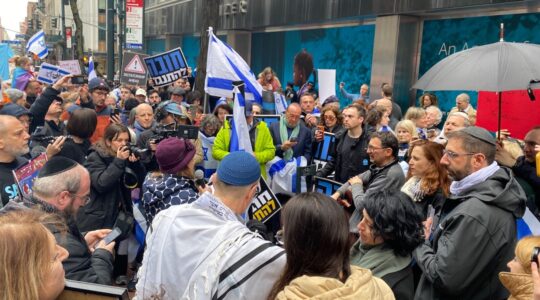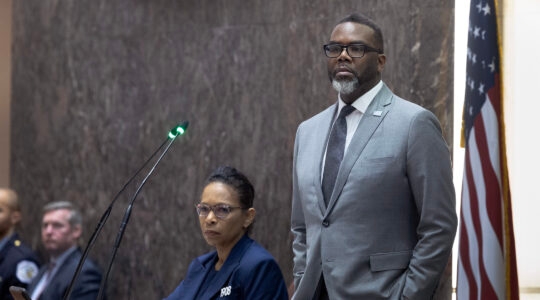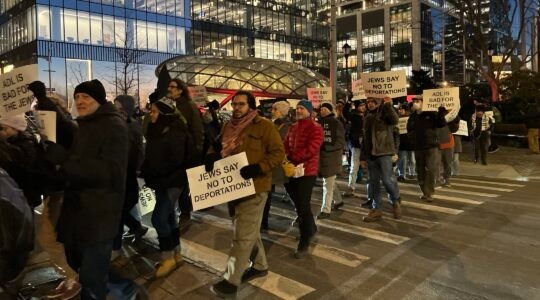SAN FRANCISCO (JTA) — Why is April 3 different from all other nights in April?On this night Conservative, Orthodox and some Reconstructionist Jews outside Israel will sit down to their second Passover seder, while Reform and Israeli Jews will eat as on any other night of the holiday. That’s long-standing tradition. But stirring the pot are some younger American Jews returning from Israel programs who want to cast off their longer Diaspora observance and adopt Israeli practice in solidarity with the Jewish state.”You come back, you’re slightly shell-shocked, and you’re trying to hold onto what you experienced there,” said Rabbi Kenneth Brander, dean of the Center for the Jewish Future at Yeshiva University.This time it really is Israel’s fault.”It’s not just Passover in particular, it’s all the other holidays that you celebrate for just one night in Israel,” said Jennifer Trebbin, 23, who spent last year in Israel with Project Otzma, a 10-month volunteer program for recent college graduates.For the first time Trebbin celebrated Passover for seven days instead of eight and attended just one seder. “Personally, I like it,” she said. “There’s something about doing it the Israeli way that feels right.”Those who lead Israel programs disavow any knowledge of the phenomenon.”I haven’t heard of it,” said Lymore Hauptman, director of Hadassah’s Young Judaea Year Course in Israel, which takes young Jews to Israel for the year before college. Officials at birthright israel, which offers free Israel trips to young Jews, also hadn’t heard of it.”I’m sure the kids talk about it,” Hauptman conceded.Indeed they do. Some seek rabbinic guidance.That’s what Mike Schwartz, now 20, did when he was on Young Judaea’s Year Course two years ago.”I talked to the Conservative rabbi on the program, and he said if you’re living in Israel, do seven days,” Schwartz said. His rabbi interpreted “living in Israel” quite broadly. The Talmud advises Jews to keep their home customs while visiting Israel unless they are planning to live permanently in Israel, in which case they should adopt Israeli custom.That’s why Julia Garfinkel, 23, started keeping shorter festivals while she was on Otzma last year — she knew she’d be staying in the country.”For me it worked out fine. It’s hard to find second-night seders anyway in Israel,” said Garfinkel, who took Israeli citizenship in September and is now a music student at Tel Aviv University. Schwartz observed Passover for seven days the year he spent in Israel, but resumed his eight-day practice back in New York, where he is pursuing a joint degree from Columbia University and the Jewish Theological Seminary.”Now that I’m living in America, I feel I should follow the halacha,” or Jewish law, “as it applies to the Diaspora,” he said.The differing practices go back more than 2,000 years to Jerusalem, when the dates for Jewish festivals in the coming month were declared by the rabbis of the Sanhedrin, the community’s legal body, according to when they sighted the new moon.As it took time for messengers to reach Diaspora communities with that report, a “yom tov sheni,” or “second festival day,” was added to biblical festivals outside Israel to ensure that Jews there observed at least part of each festival on the correct day.The extra Diaspora day was preserved even after the institution of a fixed calendar, with the Talmud declaring that Sukkot and Passover be observed for eight days, Shavuot and Rosh Hashanah for two. Yom Kippur was not extended because of the burden of fasting, and Rosh Hashanah is celebrated for two days even within Israel because it falls on the new moon instead of mid-month like the other festivals.In the 19th century, Reform leaders in the United States abandoned the extra festival day, declaring they did not accept the concept of being in exile. Most Reform Jews today understand their shorter observance as being in line with Israeli practice. Orthodox Jews continue to keep the extra days.Brander said that in his 20 years as a pulpit rabbi, he’s had to sit down “on a regular basis” with young returnees from Israel. He shows them the Jewish sources and explains that Jews in the Diaspora “aren’t in control of their destiny and can lose their calendar at any moment,” as happened in the concentration camps and in the Soviet Union. While Brander said he is “sensitive” to the desire of young American Jews to remain connected to Israel, “the challenge is to feel emotionally connected while still being rooted in Jewish law.”Most Conservative Jews also keep the extra festival days, despite a 1960s ruling by the movement’s Rabbinical Assembly permitting them to change their practice.Rabbi Paul Drazen, program development officer for the United Synagogue of Conservative Judaism, said he is not aware of any congregations that have followed that ruling. The Reconstructionist and Renewal movements do not set national policy for their congregations.Rabbi Shai Gluskin, director of publishing and online resources for the Jewish Reconstructionist Federation, said most Reconstructionist Jews observe Passover for seven days, considering the extra day an archaic custom rendered unnecessary by modern technology. But they also usually observe two seders, he said.That’s “a deeply held, long tradition in the American Jewish community,” Gluskin said, whereas the eight-day custom doesn’t have the same pull. “In Reconstructionism, we’re not looking for legal consistency,” he said.Adherents of Jewish Renewal tend to follow the movements from which they came, said Rabbi Daniel Siegel, director of spiritual resources for Aleph: Alliance for Jewish Renewal. “It wouldn’t be renewal to decree one form of legitimate practice to be better than another,” he said. “Rather we would encourage people to learn about the various options and then select the ones which are most likely to deepen the spiritual experience of the practice, keeping in mind that many of our chevre,” or members, “have meaningful connections to the mainstream Jewish movements.”Those connections run deep. Ayal Robkin, 21, who was on the Orthodox track of Young Judaea’s Year Course, said ideologically he favors a day-and-a-half festival, keeping the negative commandments on that second day, such as avoiding driving, but not the positive ones, like doing a second seder.Until halacha is changed, however, Robkin will follow Orthodox custom. “There’s a commandment, don’t separate yourself from the community,” he said.Family pressure runs deep, too. Now that she’s back in New York, Trebbin doubts she will be able to maintain her commitment to Israeli practice.”To be honest, I’m not going to tell my parents, no, I’m not coming to the second seder,” she said.
JTA has documented Jewish history in real-time for over a century. Keep our journalism strong by joining us in supporting independent, award-winning reporting.





